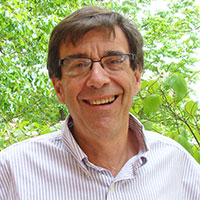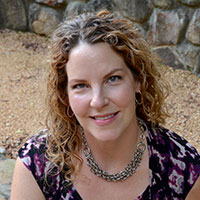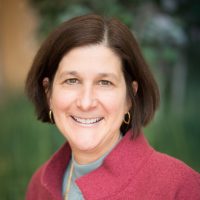Four Gillings community members honored for achievements in teaching, mentoring, research and service
April 16, 2020
Leaders at the UNC Gillings School of Global Public Health have announced the winners of four of the School’s most prestigious awards – the Bernard G. Greenberg Alumni Endowment Award for teaching, research and service; the John E. Larsh Jr. Award for Mentorship; the Edward G. McGavran Award for Excellence in Teaching; and the Harriet Hylton Barr Distinguished Alumni Award, which honors an alumnus or alumna for outstanding achievements and contributions to public health.
The 2020 winners are Todd Schwartz, DrPh, associate professor of biostatistics (for the Greenberg Award); Steven Meshnick, MD, PhD, professor and associate chair of epidemiology (for the Larsh Award); Alyssa Mansfield Damon, PhD, assistant professor of health policy and management (for the McGavran Award); and Edith Parker, DrPh, 1989 and 1995 alumna of the Gillings School and dean of the University of Iowa’s College of Public Health (for the Barr Award).
Greenberg Award

Dr. Todd Schwartz
Schwartz has earned Master of Science and Doctor of Public Health degrees in biostatistics from the Gillings School (MS ’98, DrPH ’04). Since 2001, he has held faculty positions at UNC in the School of Nursing, the School of Medicine, the Eshelman School of Pharmacy and the Gillings School. He currently serves as an associate professor of biostatistics, with a joint appointment as an associate professor in the School of Nursing and an adjunct appointment as an associate professor in the Eshelman School of Pharmacy.
He has co-authored over 160 peer-reviewed publications and is a frequent guest lecturer across many departments at UNC. Schwartz has been an advisor or committee member for more than 60 graduate students, and he has an exemplary service record, both at UNC and for external organizations. He has served on the Gillings School’s Alumni Association Board as a representative for the Biostatistics Department and has also worked as an alumni liaison for the Biostatistics Student Association.
In 2009 and 2015, Schwartz received the School of Nursing’s Faculty Award for Excellence in Doctoral Mentorship and Education – an award for which he has been nominated on several occasions.
Schwartz’s research is primarily collaborative in the fields of nursing, medicine and public health, with a focus on study design, conduct, analysis and dissemination. He also has published on innovative pedagogical methods, including the “flipped” classroom. Through his publications and service to the profession, he has developed a national reputation for innovative methods in teaching statistics.
“Dr. Schwartz made lectures extremely accessible,” wrote one nominator, “and he obviously cared that students understood the material. One particular instance comes to mind: I asked a question during a lecture about an idea that he had presented and that I had seen presented in a slightly different way in another class, and I was trying to connect the two. He answered my question during the lecture, and we chatted a bit about it after class as well. Another day, Dr. Schwartz approached me in the biostatistics department to chat about the same question. He could see that I had still been struggling with the connection, made a note of it, and took the time to engage in conversation again.”
“Todd has been instrumental in supporting students both inside and outside of the classroom,” another nominator wrote. “He co-teaches BIOS 665 with Dr. Gary G. Koch, and it is one of our more popular courses, even as a service course. There are consistent positive comments regarding his teaching, student interaction and support on the course evaluations. Outside of the classroom, Todd has organized many discussion panels for both the masters and doctoral students. He reaches out to our alumni to have them come back to their alma mater and share with the current students a multitude of information. They share their experience navigating the employment world and the obstacles they encountered along the way, as well as what employers are looking for in an employee. Students have found this most beneficial. I could not think of anyone more deserving of this award than Todd.”
The Bernard G. Greenberg Alumni Endowment Award, established in 1986 by the School’s alumni association, is presented to an outstanding full-time, mid-career Gillings School faculty member for excellence in the areas of teaching, research and service. The award, which includes a cash prize of $12,000 annually for three years, honors Dr. Greenberg, a visionary leader who founded the School’s biostatistics department in 1949 and chaired it for more than 20 years before serving as dean of UNC’s public health school from 1972-1982. The major criterion for the award is continuously demonstrated excellence over a number of years in service to the broad public health community.
Larsh Award

Dr. Steve Meshnick
Steven Meshnick, MD, PhD, is the winner of the 2020 Larsh award.
Meshnick, who joined the Gillings School faculty in 2001, holds a medical doctorate from Cornell University and a doctorate in medical biochemistry from Rockefeller University. Within the Department of Epidemiology at UNC, he has served as professor, director of graduate studies, director of the doctoral program and associate chair. He is currently a professor of epidemiology, as well as a professor of microbiology and immunology within the School of Medicine.
Meshnick has worked on tropical infectious diseases, especially malaria, for more than 30 years and has produced more than 375 scientific publications. His research focuses on a variety of aspects of malaria, including drug resistance, the pathogenesis of malaria in pregnancy and molecular tools that can be used for the diagnosis and surveillance of malaria. He has also studied insect-repellent clothing and other vector-borne diseases, such as dengue and spotted fever rickettsiosis.
He has a long-standing commitment to training and capacity-building and has been the primary mentor for 48 doctoral students and 12 post-doctoral students, including many from developing countries.
“Dr. Meshnick always made time to meet with students in his lab or office in the capacity of professor, mentor and friend,” wrote one nominator. “Dr. Meshnick listened as we explored research questions and developed our reasoning, despite the many competing demands that he must have been dealing with as a professor and researcher. He treated us as knowledgeable and capable partners in our own research and education. In the environment of a stressful PhD program, Dr. Meshnick also handled the personal with aplomb, allowing us to be human and sharing his own humanity. I recall Dr. Meshnick telling me once that I didn’t ever cry in our meetings, which made me realize that he was regularly addressing complex student experiences and gave me even more respect for the open and supportive research environment he maintained. Dr. Meshnick has inspired many with his passion for global health. He demonstrates commitment to building meaningful capacity among students as well as among researchers and scientists internationally.”
“Steve Meshnick is the definition of a true mentor,” another nominator wrote. “He knows just what to say and when to say it. I remember him saying one day, ‘I have no insight into this today. Let’s check in tomorrow.’ He knows himself and knows his limits, knows when to offer advice and when to hold back. This is what makes him truly the best mentor imaginable. Having Steve as a mentor over the past three years has been foundational in my research career. I can honestly say I may not have pursued a career in research without his influence. He took me on as a mentee without any hesitation, allowing me to take charge of a Gillings Innovation Lab grant proposal. While I was plenty green, he inspired me to have confidence in my own abilities and to learn the skills I would need. In fact, he single-handedly supported me towards a master’s degree when I had no funding of my own for it. He shows a genuine interest in my interests, even when they do not align with his own.”
Established in 1997, the John E. Larsh Jr. Award for Mentorship recognizes a current member of the Gillings School faculty who best exemplifies the qualities of mentoring and commitment to students that Dr. Larsh embodied and valued so highly. Larsh was a health behavior faculty member from 1942 to 1981. The $4,000 prize may be used in any way that enhances the faculty member’s ability to mentor and support students.
McGavran Award

Dr. Alyssa Mansfield Damon
Alyssa Mansfield Damon, PhD, is the winner of the 2020 McGavran Award.
Damon, an assistant professor, earned her Master of Public Health, Master of Health Administration and doctoral degrees from the Gillings School (MPH ’99, PhD ’09, MHA ’14). She joined the faculty of the Department of Health Policy and Management in 2015 and also currently serves as a faculty research fellow at the Cecil G. Sheps Center for Health Services Research. She teaches graduate courses in operations research for health care systems and statistical methods for health care policy and management.
Damon is a health care epidemiologist and a leader in leveraging data to identify opportunities for maximizing healthcare value by addressing access, utilization, costs and quality. Her clinical and research experience has focused primarily on the psychological and behavioral aspects associated with health and healthcare. She has worked with special populations, including adolescents, women and military and veteran communities.
In 2019, Damon represented the Department of Health Policy and Management as the recipient of a Teaching Innovation Award. She was nominated by students for her outstanding commitment to improving the learning environment at the Gillings School through the integration of new technologies, interactive activities, creative assessment methods and progressive curriculum ideas.
“Professor Alyssa Mansfield Damon is hands down the most prepared, organized and diligent professor I have experienced at my time at UNC-Chapel Hill,” one student nominator wrote. “If a student doesn’t understand a concept or is underperforming, she makes it her personal imperative to mentor that student by providing one-on-one course help. I can personally attest to her exceptional performance as I began her class struggling to attain a passing grade and ended the semester receiving a high pass on her cumulative final exam.”
“Alyssa is a professor that goes above and beyond the call of simply teaching in the classroom,” wrote another student nominator. “She provides her students with the skills necessary to succeed – not only at Gillings but in our eventual careers. I believe all professors and teachers are educators because they believe in enabling their students to get the most out of their education. However, there are a select number of teachers and professors that make a lasting impression on their students. I strongly believe Alyssa is one of those professors for me. Having Alyssa as a professor has helped me achieve goals I would not have possibly imagined when first starting at Gillings. Alyssa makes sure no student is left behind, and she ensures we are all engaged with learning the material and how it will apply in real-world situations. Through her teaching and mentorship, I feel as if I have truly grown into my own at Gillings. I am excited to see what my next year and my career will become because of her.”
The McGavran Award for Excellence in Teaching honors Edward G. McGavran, MD, MPH, dean of the UNC School of Public Health from 1947 to 1963 and proponent of “hands-on” field training for public health students. First given in 1975, the award recognizes career-long excellence in teaching by a faculty member at the Gillings School.
Barr Award

Dr. Edith Parker
Edith Parker, DrPh, is the 2020 Barr awardee.
Parker, who earned Master of Public Health and a Doctor of Public Health degrees from the health behavior department at the Gillings School (MPH ’89, DrPh ’95), joined the University of Michigan’s School of Public Health as an assistant professor after obtaining her doctoral degree. While at the University of Michigan, she was a member of the Urban Research Center and undertook community-based participatory research to address social and environmental determinants of asthma among African American children living in Detroit. From 2005 to 2010, Edith served as associate dean for academic affairs before transitioning to the University of Iowa (UI) College of Public Health.
At UI, Parker spent eight years as chair of the Department of Community and Behavioral Health. In 2018, she was appointed to the position of dean of UI’s College of Public Health, where she currently serves.
Her passion for public health led her into service long before she entered graduate school at UNC. After her undergraduate studies, she spent several years overseas working at a school in Kenya, followed by work with Save the Children in Burkina Faso as a program support officer. These experiences shaped her perspectives on community engagement and her commitment to serving and working with populations in need.
Parker’s research focuses on health equity – specifically on the design, implementation and evaluation of community health promotion interventions to improve health status and reduce racial disparities in health. She is an expert in community-based participatory research, which emphasizes the active involvement of community members in all aspects of the research process. Her expertise also includes translating and disseminating research findings for program and policy change.
“Edith [has a] strong commitment to developing the next generation of diverse public health leaders,” the nomination letter stated. “More impressive than the awards she has received for mentoring and faculty excellence are the stories of how she has gone above and beyond to support her students. Edith has worked hard to attract and retain faculty of color. She has also gone out of her way to support her students of color, many of whom come from other countries.”
“Edith is a gifted teacher and mentor,” wrote another nominator. “She is dedicated to an engaged and co-learning process that promotes critical thinking and the application of knowledge and skills. While on the faculty at the University of Michigan, she was sought out by numerous masters and doctoral students, who greatly benefitted from her tutelage. These former students have gone on to become stellar practitioners and scholars – furthering the impact of Edith’s efforts.”
“Edith cares. She cares deeply and equally,” the nomination letter continues. “She cares about communities, peers, students and other faculty. And it is this underlying quality that has enabled Edith to achieve so much.”
Established in 1975, the Harriet Hylton Barr Distinguished Alumni Award recognizes the achievements of alumni and their contributions to public health. Each year, it honors a deserving graduate of the School working full-time in public health or in a related field. The award carries the name of its 1980 recipient, the late Harriet Hylton Barr, who earned a Master of Public Health degree from the Gillings School in 1948 and dedicated 28 years of service to the School as an associate professor of health behavior and the first director of alumni affairs.
Contact the Gillings School of Global Public Health communications team at sphcomm@unc.edu.
